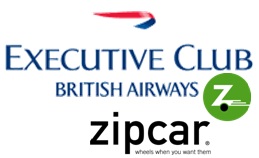Car sharing – a new playground for FFPs?

12 October 2014
The partnership between British Airways’ Executive Club and car sharing company Zipcar didn’t get a lot of attention in the market. But as a matter of fact, it is the first partnership of such a kind in the industry. Are there more to come?
The first partnerships in the loyalty industry evolved quickly after the launch of programs and up to today, even new FFPs would typically look at setting up at least some basic non-air partnerships at an early stage. And the first picks are almost always hotels and car rental companies, as they represent the most basic needs of frequent flyers. What the sense for a small FFP with a database of 90% of local customers is to have a partnership with the airport hotel at its home base is though a different question to be looked at another day…
As we all know, partnerships at major FFPs have evolved for quite some time from the classical business travel chain to include anything from day-to-day grocery partners to hospitals. The revenue aspect clearly dominates the considerations of being a logical fit at many programs these days.
However, what most programs tend to oversee in this context is that also the original mobility notion has evolved and mobility 2014 is definitely not the same anymore as mobility in the 90ies or even the 80ies. Actually, the term “mobility” was even not in use at that time.
The latest trends in mobility embrace aspects such as mobile communication, changed distribution channels (watch out for new players such as Google!) and new travel behaviours. The biggest hotel “chain” these days? This is no longer a competition between Hilton, Marriott and InterContinental Hotels Group, but BnB has surpassed them since long in terms of number of beds. What is more powerful than taxis? Uber! But which FFP has recognised that trend and partnered with BnB or Uber? None.
The even more remarkable is therefore the move by British Airways in another area: A few years ago, it streamlined its car rental partner portfolio to work exclusively with Avis as Executive Club partner. Now it has revisited this policy, but not in order to partner with one of the other big players such as Hertz or Europcar (which would probably be keen on doing so!), but with the comparably small company Zipcar, a British car sharing company with 1,600 vehicles in Southern England and selected countries in Europe and North America. With such a small company and members earning 50 miles per rental day, this is unlikely to evolve into a major revenue stream for the Executive Club – but more importantly, the program becomes the first FFP to tap into the growing market of car sharing like that.
While such new markets tend to be fragmented at the beginning, consolidation will ultimately occur and I think that loyalty programs are well advised to position early in such new markets rather than waiting until they sit with powerful and quasi monopolistic companies like BnB at one table. Although Hertz and Marriott are still safe bets for partnerships for most FFPs, this is unlikely to be sufficient going forward for FFPs looking at diversifying their membership basis and trying to attract members beyond the traditional high yield corporate traveller – for whom there is simply no value in traditional FFP partnerships as they don’t use the services of these companies. I would therefore predict that we will see more tie-ups à la Executive Club/Zipcar – and not necessarily at the biggest FFPs, but at the smartest ones.







